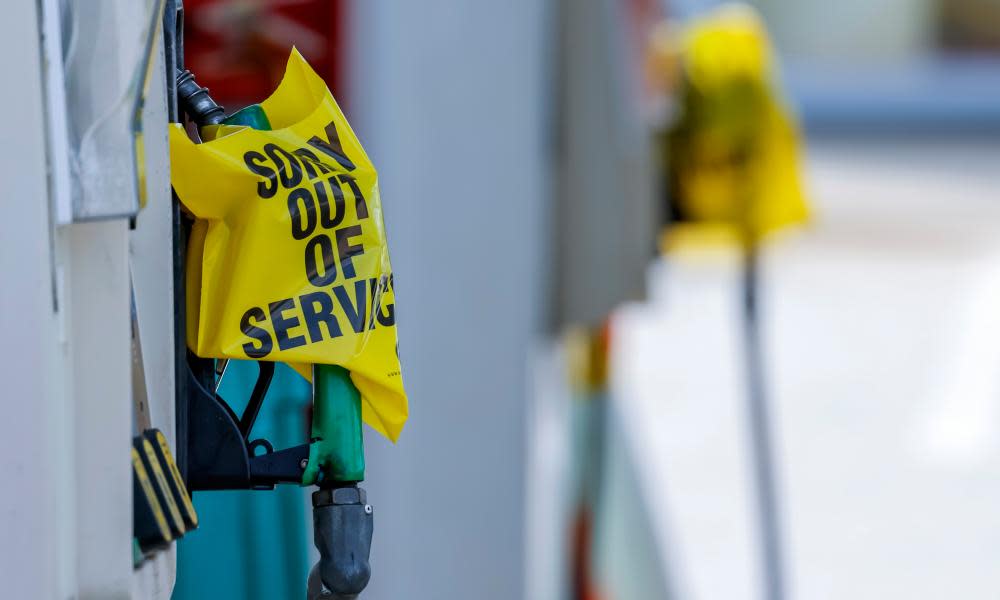Largest US pipeline restarts operations after hack shut it down for nearly a week

The largest fuel pipeline in the US has restarted operations nearly a week after a cyber-attack forced its shutdown, prompting distribution problems and panic-buying that drained supplies at thousands of gas stations.
Colonial Pipeline initiated the restart of operations late Wednesday, saying in a statement: “All lines, including those lateral lines that have been running manually, will return to normal operations.”
But the company said it would take several days for deliveries to return to normal.
We just got off the phone with #ColonialPipeline CEO. They are restarting pipeline operations today at ~5pm. More soon.
— Secretary Jennifer Granholm (@SecGranholm) May 12, 2021
The news came as fuel shortages were still taking hold in parts of the US as panicked drivers fill up their tanks in response to last week’s ransomware attack upon the key gasoline artery for the east coast.
The FBI confirmed on Monday that the ransomware group responsible for the compromise of the pipeline network that supplies petrochemicals to the north-eastern US is DarkSide, an experienced collective of cybercriminals which has hacked scores of companies in the US and Europe.
Colonial has not so far paid any ransom, according to a report in the Washington Post on Wednesday afternoon.
The shortages are most acute in the US south-east, with one in five gas stations in Atlanta reported to be out of fuel on Tuesday evening. About one in 10 gas stations in North Carolina, Virginia and Georgia have run dry of fuel, according to GasBuddy, an app that tracks fuel prices and demand.
Many drivers have been left in lines for an hour or more to fill up their cars due to panic buying of fuel in the wake of the Colonial Pipeline shutdown. The pipeline, which moves nearly half of the east coast’s fuel from refineries on the Gulf of Mexico, was shut down on Friday by hackers who demanded money to restore access. The FBI has blamed DarkSide, a hacking group, for the disruption.
Related: Energy secretary urges Americans not to hoard gasoline after pipeline hacked
Earlier, the US energy secretary, Jennifer Granholm, urged Americans to not hoard gasoline.
“Let me emphasize that much as there was no cause for, say, hoarding toilet paper at the beginning of the pandemic, there should be no cause for hoarding gasoline,” Granholm said.
The surge in buying has pushed fuel prices to their highest levels in six years, according to the American Automobile Association (AAA). “People are taking their entire family fleet of vehicles to the gas station and filing up when they don’t need to,” Tiffany Wright, a spokesperson for AAA, told CNN. “We are our own worst enemy in this situation because we are over-consuming at the pump.”
A state of emergency has been declared by Virginia, Georgia, North Carolina and Florida, with some states and the federal government suspending various fuel regulations in order to ensure an adequate supply.
North Carolina’s governor, Roy Cooper, urged people Wednesday to only buy gas if their tanks were low, and to report any instances of price gouging.
“This news is another reason people do not need to panic-buy gas right now unless they really need it,” he tweeted after Colonial announced it was restarting the pipeline.
Georgia was also getting squeezed, with 43% of stations there out of gas, according to Gasbuddy.com. In Virginia, 44% of stations were out, and in South Carolina, 16% had no fuel.
The disruption could still last for a week or more, with the AAA warning that states including Mississippi, Tennessee and Delaware are likely to experience limited fuel and price increases in the coming days. Granholm said the federal government “will have no tolerance for price-gouging” and urged drivers to report any huge price hikes.
Agencies contributed reporting

 Yahoo Movies
Yahoo Movies 
